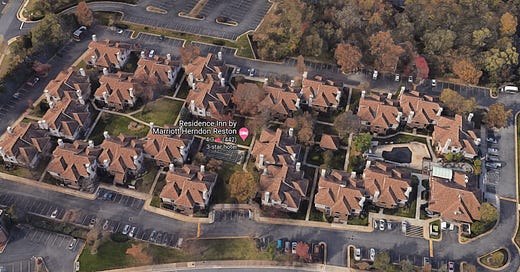Local news is great. A lot of the material for this newsletter comes from Twitter, where I follow lots of people involved in the issues I write about. But a lot of it also comes from hyperlocal news sources, where you can learn all sorts of granular details about what’s happening on the ground in the immediate place you live.
Two local sites, Fairfax Now and Reston Now, provided the genesis of this post. It happens that two hotels not far from my home home—one in Herndon, the next town over from Reston, and one in Tysons, on the next Metro stop—are being considered for new housing projects.
Now if these were just demolition and redevelopment proposals for run-down hotels, they wouldn’t be terribly interesting. But they’re not—they’re both somewhat interesting hotels architecturally, and both proposals intend to renovate, not demolish, the buildings.
You sometimes see a version of this out on rural highway stretches—a little old motel with no sign and a row of mailboxes out front. For retirees and/or people without a lot of money, it can be an adequate place to live. This one was out on U.S. Route 11, somewhere in the Shenandoah Valley.
These proposals are a higher-end version of this, making use of rooms and infrastructure that already exists. It’s a much easier alteration than turning office towers into apartments, and I think it’s kind of cool.
There’s something interesting going on here. The idea of turning aging or surplus hotel rooms into basic housing reads sort of as “innovation” or a big idea today. But that’s basically the way hotels evolved in the 19th and early 20th century. Luxury hotels often ended up as boarding houses.
It’s almost as if we’ve had to relearn how the built environment naturally evolves, after an interlude where we used a boom in technology and wealth to try to bypass those natural processes.
It reminds me of this bit I wrote awhile ago for The Lamp, a Catholic magazine, of all things, that also publishes a lot of interesting life and culture pieces. I don’t think it has been un-paywalled but here’s a snippet, where I was talking about New Urbanists rediscovering old ways of building towns and cities (emphasis added):
The first generation of New Urbanists visited pre-World War II towns, neighborhoods, and cities, observing and recording the fine details of curbs, streets, setbacks, and more. So much of the country’s existing fabric was built according to traditional methods and design standards, yet that working body of knowledge, that “information ecosystem,” was more or less extinct by the 1980s, buried under a regulatory avalanche of single-use zoning and car-oriented planning. The ideas of the streetscape, the interplay between private and public spaces, the street as a “public room,” no longer animated planning or architecture. While it had once been possible to build with beauty almost unselfconsciously, relying on that body of knowledge, it is now considered a sort of boutique concern.
New Urbanists essentially had to treat existing American settlements as specimens, and use them to reverse engineer that old understanding of town-building. What are now known as “form-based codes” were attempts to codify this previously widely known body of town-building and place-making knowledge.
Anyway, maybe you’re curious about the hotels. The first one is a business-oriented Sheraton, from the 1970s, with the higher rooms inside this glass tower. It’s a neat building that’s one of the first things you see approaching the area.
The other one is less remarkable, but perhaps even better suited for housing. It’s interesting how closely it resembles a lot of newer mid-rise apartment buildings meant to look like houses. And as an extended-stay hotel, it also has full kitchens and separated bedrooms.
If you know more than I do about how these kinds of projects actually work on the ground, are they a good idea? Is it better to put something modern and new on this land—especially highly valued land in the D.C. area—or to adapt what’s already there for what’s now a more pressing use? Would you like to live in a former hotel?
Related Reading:
Still Renting After All These Years
Please consider upgrading to a paid subscription to help support this newsletter. You’ll get a weekend subscribers-only post, plus full access to the archive of nearly 300 posts and growing. And you’ll help ensure more material like this!







